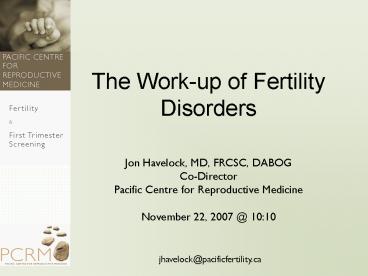The Workup of Fertility Disorders - PowerPoint PPT Presentation
1 / 25
Title:
The Workup of Fertility Disorders
Description:
Oligo and/or anovulation. Polycystic ovaries on ultrasound ... Must exclude other etiologies of anovulation and hyperandrogenism. Polycystic Ovary Syndrome ... – PowerPoint PPT presentation
Number of Views:82
Avg rating:3.0/5.0
Title: The Workup of Fertility Disorders
1
The Work-up of Fertility Disorders
- Jon Havelock, MD, FRCSC, DABOG
- Co-Director
- Pacific Centre for Reproductive Medicine
- November 22, 2007 _at_ 1010
jhavelock_at_pacificfertility.ca
2
- Presentation may be found at
- www.pacificfertility.ca
3
Infertility
- Lack of conception after 1 year of regular,
unprotected intercourse - 85 of couples conceive within 1 year
- 93 of couples conceive within 2 years
- lt 35 years of age
- Seek infertility investigation and management
after 12 months of trying - 35 years of age
- Seek infertility investigation and management
after 6 months of trying
4
Infertility Work-up
5
Regular Coitus
- Conception occurs on day of and 5 days before
ovulation1 - Only 6 of pregnancies can be attributed to sperm
3 days old - Probability of pregnancy is 37 with daily vs 15
when weekly
1. Wilcox AJ et al. N Engl J Med 1995. 3331517-21
6
Ageing and Ovarian Reserve
7
Ageing and Ovarian Reserve
8
Ovarian Reserve Testing
- Basal Testing
- Dynamic Testing
- Day 3 FSH
- Day 3 Estradiol
- Antral Follicle Count
- Day 3 Inhibin
- Day 3 Antimüllerian Hormone
- Ovarian Volume Measurements
- Clomiphene Citrate Challenge Test (CCCT)
- Exogenous FSH Ovarian Reserve Test (EFORT)
- GnRH agonist stimulation test (GAST)
9
Ovarian Reserve Testing
- Day 3 FSH
- Pituitary hormone measured by chemiluminescent
assay - Kept low in the early follicular phase by
feedback inhibition from Inihibin B production
from the ovary - Normal range varies
- 10 IU/L often cut-off for abnormal
- Often used for predicting In Vitro Fertilization
- Pregnancy OR 0.58 when 10 IU/L1
- Sensitivity 7 and Positive Predictive Value
902 - All infertility patients should be screened
- Yanushpolsky EH, et al. Fertil Steril 2003.
80111-115 - Jain T et al. Fertil Steril 2004. 82 180-185
10
Ovarian Reserve Testing
- Day 3 Estradiol
- Ovarian steroid measured by chemiluminescent
assay - Production stimulated by FSH
- Minor feedback inhibition role on FSH secretion
at the anterior pituitary - Elevated day 3 levels indicate subtle FSH
increases not detected by assay - Normal range lt 300 pM
- Often used for predicting In Vitro Fertilization
outcomes
11
Ovarian Reserve Testing
- Clomiphene Citrate Challenge Test
- Stress test of the ovary
- Mechanics of Test
- Day 3 FSH level
- Clomiphene Citrate 100 mg daily from days 5-9 of
cycle - Day 10 FSH level
- Often used for predicting In Vitro Fertilization
outcomes - Pregnancy OR 0.40-0.58 when 10 IU/L on either
day 3 or 101 - Sensitivity 26 and Positive Predictive Value
902 - Age gt 35-40
- Unexplained infertility gt 2 years
- Yanushpolsky EH, et al. Fertil Steril 2003.
80111-115 - Jain T et al. Fertil Steril 2004. 82 180-185
12
Ovarian Reserve Testing
- Antral Follicle Count (AFC)
- Performed in the early follicular phase
- Endovaginal ultrasound
- Determination of follicles between 2-9 mm in each
ovary - Normal values
- 4-10 per ovary
- Before age of 37 - AFC mean yearly decline of
4.81 - After age of 37 - mean yearly decline of11.7
- Scheffer GJ et al. Fertil Steril 1999. 72 845-51
13
Polycystic Ovary Syndrome
- Diagnosis of Exclusion
- 2003 Rotterdam Criteria (2 of 3 required)
- Oligo and/or anovulation
- Polycystic ovaries on ultrasound
- Clinical or biochemical evidence of
hyperandrogenism - Must exclude other etiologies of anovulation and
hyperandrogenism
14
Polycystic Ovary Syndrome
15
Documentation of Ovulation
- Regular menstrual cycles1
- 24-35 days
- Basal Body Temperature
- Rise of 0.4 0C for 11 days
- Endometrial Biopsy
- Midluteal Serum Progesterone
- Test 7 days before expected menses
- 10 nM consistent with ovulation2
- Malcolm CE et al. Obstet Gynecol 2003. 102
317-318 - Israel R et al. Am J Obstet Gynecol 1972. 1972
112 1043-1046
16
Documentation of Ovulation - LH Kit testing
- Chemiluminescent polyclonal-monoclonal antibody
assay - Ovulation occurs 20-24 hours post urine LH surge
- Many commercially available products
- Clear Blue, First Response
- Never shown to increase pregnancy rates
- Miller PB et al. Obstet Gynecol 1996. 87 13-17
17
Documentation of Ovulation - Fertility Monitors
- Clear Blue Easy Fertility Monitor
- Measures estrone-3 glucuronide and LH surge
- Metabolite of estradiol
- Rises 1-5 days before the LH surge to identify
peak fertility - 91 effective in identifying LH surge
18
Male Factor
- Semenanalysis
- Abstinence from 2-5 days
- Masturbated specimen into sterile container and
examined within 1 hour - If any abnormality, repeat sample
- Not a test of fertility
- Does not assess sperm function
19
Documentation of Adequate Sperm Parameters - WHO
- Liquefaction within 60 minutes
- Appearance homogeneous, grey
- Consistency not viscous
- Volume 2.0 mL
- Concentration 20 million/mL
- Total sperm count 40 million/mL
- Motility 50
- Morphology gt 14
- pH 7.2
- WBC 1 million/mL
20
Documentation of Adequate Sperm Parameters
1. Guzick D et al, N Engl J Med 1999.
21
Turek PJ et al. Nat Clin Pract Urol 2005.
2226-238
22
Utero-Tubal/Peritoneal Factors
- Hysterosalpingogram
- Screening test for uterine and tubal
abnormalities - Performed between days 8-14 of menstrual cycle
- May have a therapeutic component in first 1-6
months post-procedure - Typically with oil-based contrast
- Uterine abnormalities need further evaluation by
hysteroscopy - Tubal abnormalities need further evaluation by
laparoscopy
23
Utero-Tubal/Peritoneal Factors - Hydrosalpinx
24
Utero-Tubal/Peritoneal Factors Uterine Septum
25
Utero-Tubal/Peritoneal Factors Uterine Filling
Defects































